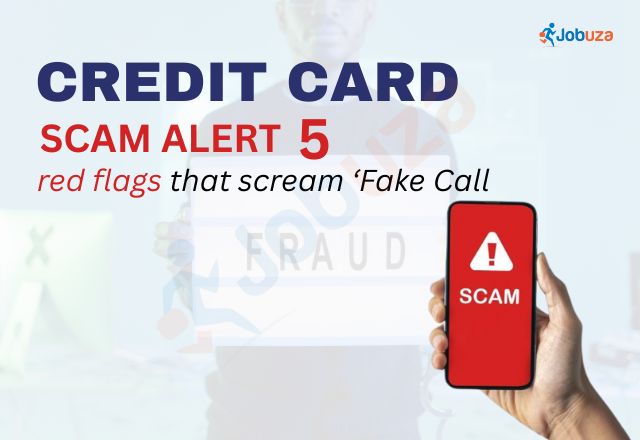Credit Card Scam Alert: 5 Warning Signs You’re Getting a Fake Call
The growing adoption of credit cards across India, financial frauds especially those involving scam calls have become alarmingly common. These scams are not only well-planned but are constantly evolving, making it essential for consumers to stay alert and informed.
Understanding the warning signs of fake credit card calls is critical to protecting your financial security and long-term well-being. In this guide, we highlight five major red flags that indicate a potential scam, and share actionable steps for you can take to stay safe.
-
Unsolicited Calls Claiming to Be from Banks or the RBI
One of the most common credit card scams involves fraudsters impersonating representatives of reputed institutions such as the Reserve Bank of India (RBI), the Securities and Exchange Board of India (SEBI), or popular commercial banks. They often claim there are issues with your credit card and may even threaten account suspension.
For instance, the Press Information Bureau (PIB) recently debunked a scam in which callers posed as RBI officials to mislead consumers. It is important to understand that legitimate financial authorities will never call you out of the blue with such threats. Always verify such claims by contacting the institution through its official website or helpline before taking any action.
-
Requests for Sensitive Personal Information
Legitimate banks will never ask for confidential details such as your credit card number, CVV, OTP, or ATM PIN over a phone call. Fraudsters, however, frequently use fake credit card enhancement offers or urgent notifications to lure victims into sharing this information.
A recent case involved a group operating near the Noida-Delhi border who tricked hundreds of people with fake offers, collecting their personal financial information and stealing money. To protect yourself, never disclose sensitive information to unsolicited callers, regardless of how convincing they sound.
-
Pressure Tactics and a False Sense of Urgency
Scammers rely heavily on creating panic. They may say your credit card is blocked, or that you have won a prize and must act immediately to claim it. These tactics are designed to force you into making snap decisions without verifying the authenticity of the call.
Genuine institutions will never pressure you into sharing details or making payments instantly. If a caller tries to rush or scare you, hang up immediately. Then, contact your bank directly using official channels to confirm whether there is any issue with your account.
-
Spoofed Caller IDs and Unusual Payment Requests
Some scam calls appear to come from an official number due to caller ID spoofing. In these cases, the number might look legitimate, but the person on the other end is a fraudster. They might also request payments through suspicious methods such as prepaid gift cards, e-wallets, or even cryptocurrency.
These are clear indicators of a scam. Authentic banks will always use traditional and secure payment methods, and will never ask for payment in unconventional forms.
-
Offers That Sound Too Good to Be True
Beware of unsolicited offers that seem overly generous—such as massive credit limit increases, lifetime free cards, or guaranteed cashback and rewards. While these offers may sound tempting, they are often a cover for phishing attempts.
Always verify any credit card offer by visiting the official website of your bank or calling their customer care number. Never trust offers received via unknown calls or messages without verification.
How to Protect Yourself from Credit Card Scam Calls
To stay safe from credit card fraud, follow these simple but effective practices:
-
Verify Caller Identity: If you receive an unexpected call regarding your credit card, hang up and contact your bank’s official helpline to verify the claim.
-
Never Share Personal Information: Refrain from sharing sensitive information like OTPs, CVVs, and PINs with anyone over the phone, especially if the call was unsolicited.
-
Report Suspicious Calls Immediately: Notify your bank and local authorities about scam attempts. You can also file a complaint with the cybercrime cell or lodge an FIR at your nearest police station.
-
Stay Informed: Educate yourself about common scam techniques, read up on financial safety measures, and always stay calm when dealing with suspicious calls.
Final Thoughts
Credit Card Scam Alert: Fake credit card calls are a serious threat to your financial well-being. However, by recognizing the red flags and staying vigilant, you can protect yourself and your loved ones from falling victim to fraud. When in doubt, always verify the information through official sources and never act in haste.
Would you like this formatted as a downloadable PDF for easy sharing or publishing on your site?



